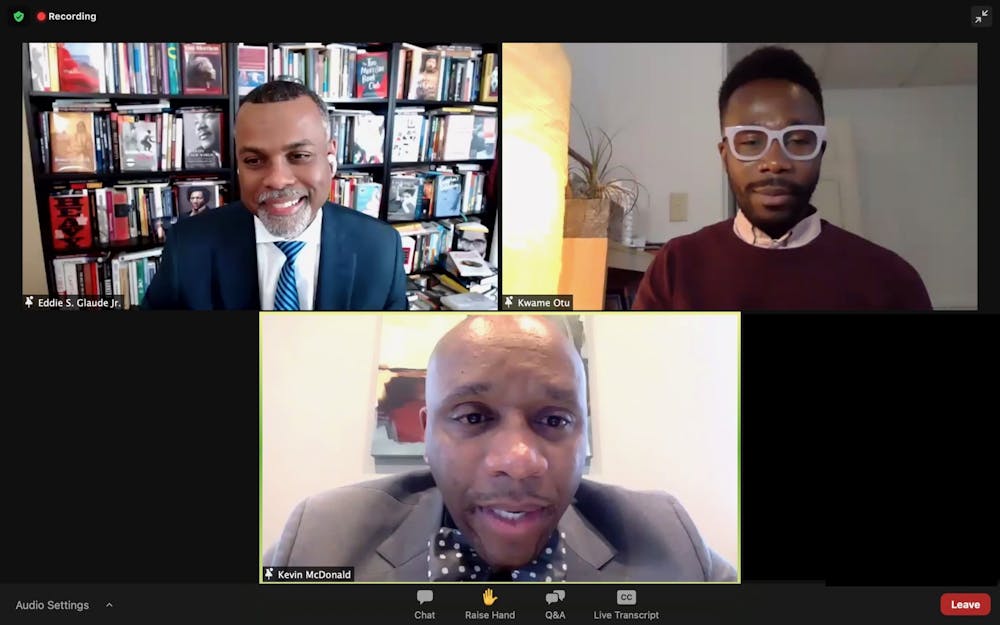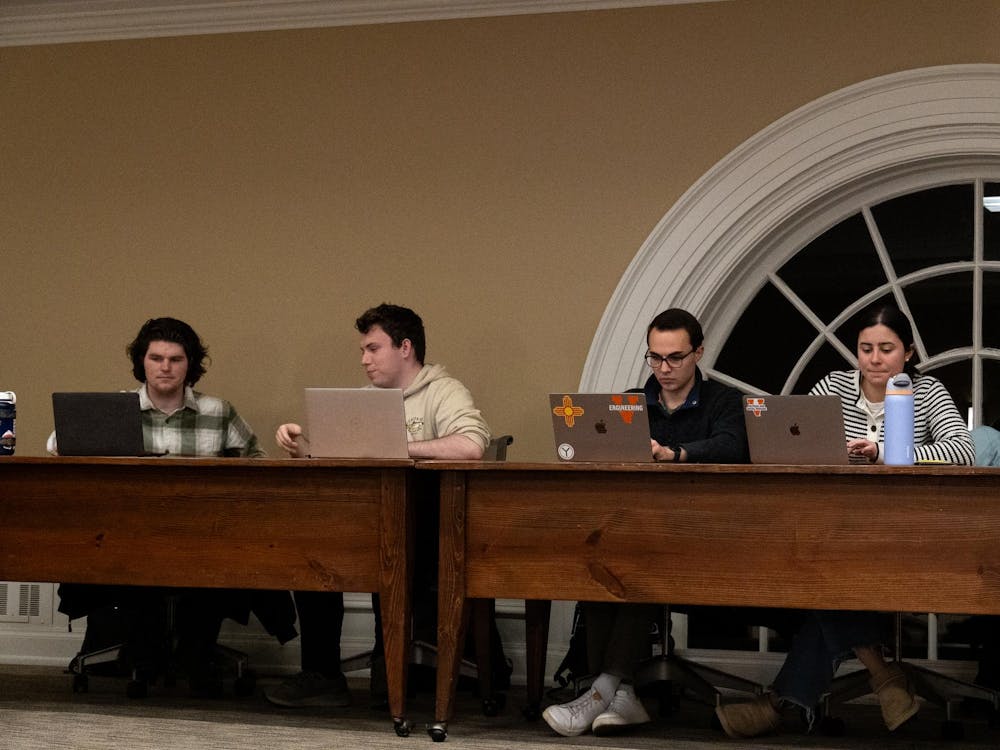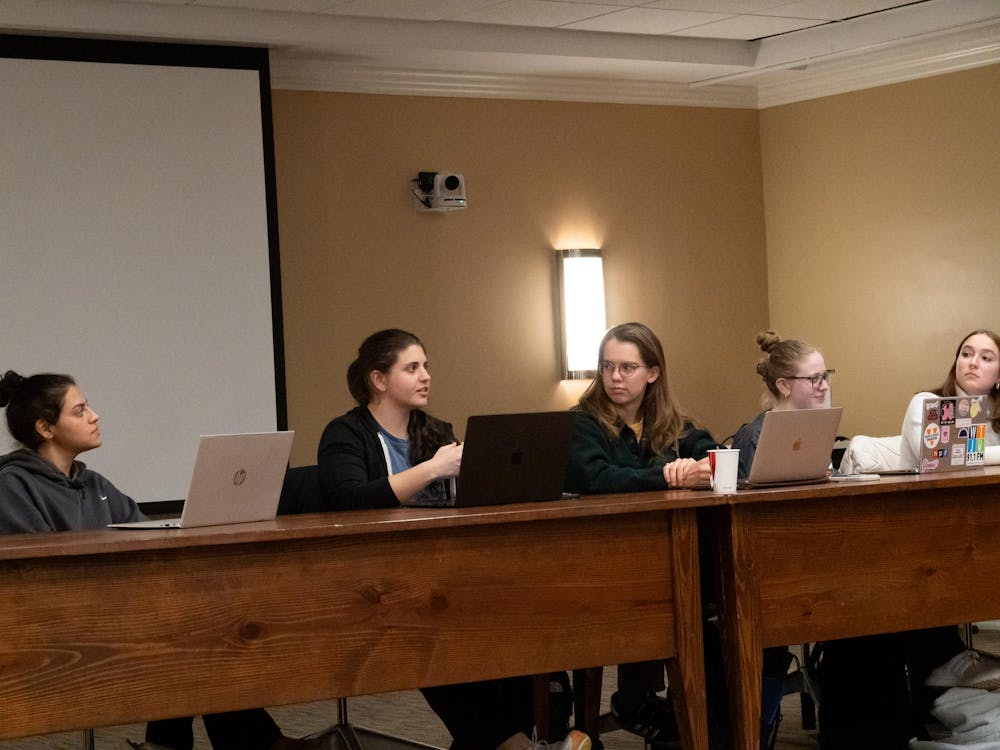The University’s Division for Diversity, Equity and Inclusion hosted Eddie Glaude Jr. to discuss race in America through the words of poet James Baldwin Thursday afternoon via a Zoom webinar. The event was co-sponsored by the Carter G. Woodson Institute for African-American and African Studies and 100 Black Men of Central Virginia and is part of an ongoing racial equity speaker series.
Glaude is a professor at Princeton University who teaches African American Studies and has written books on Black communities in America and the challenges democracy faces. The talk centered around current race relations in America, and Glaude drew quotes from poet and activist James Baldwin — which were written over three decades ago — to reflect the pervasiveness of white supremacy and racism in America.
Kevin McDonald, vice president for Diversity, Equity, Inclusion, and Community Partnerships, began the event by acknowledging the thousands of enslaved laborers who built and worked at the University in the mid-19th century before introducing the event’s moderator — Kwame Otu, assistant professor of African American and African Studies at the University.
Glaude began with a quote from Ralph Waldo Emerson to reflect on the current time we’re in.
“I'm reminded of Ralph Waldo Emerson in 1844 and where he wrote … ‘The poet is one who shall draw us with love and terror,’ who sees through our comforting illusions, to ‘chaunt our own times and social circumstances,’ and speaks of the unique genius that is America,” Glaude said.
He then reminded listeners of the violent, predominantly white mob of Trump supporters who breached the Capitol Jan. 6 with the aim of stopping the count of Electoral College votes that verified President Joe Biden’s presidential victory. Glaude contrasted the actions of police officers during the riot with their treatment of protestors in the aftermath of George Floyd’s murder last May.
“I recall … startling images of police aggressively accosting protestors [in Minneapolis],” Glaude said. “On Jan. 6 though, as some police risked and gave their lives in defense of the Capitol, I saw others taking selfies.”
Additionally, Glaude said the Capitol insurrectionists — some of whom wielded “white militia paraphernalia” — showed the fragility of democracy and the threats it faces.
“This was a riot fueled by white resentment, white grievances and white hatred,” Glaude said. “What has been revealed is that this ideology of white supremacy threatens, once again, to swallow whole this fragile experiment in democracy.”
The combination of COVID-19, the Capitol insurrection and a historic racial reckoning — initiated by protests against police brutality following George Floyd’s murder — caused Glaude to ask, “How do we imagine unity in the face of all of this?”
This is where he turned to Baldwin.
In his book published last year, “Begin Again: James Baldwin's America and Its Urgent Lessons for Our Own,” Glaude draws lessons from Baldwin’s poetry to look at race in America today. Baldwin was known for writing on topics of race, sexuality and class, and his writing ran in parallel to some of the major movements of the mid-twentieth century, including the civil rights movement and the gay liberation movement.
To Glaude, the Capitol riot was reminiscent of conservatives countering the Black Freedom Movement — the period encompassing both the civil rights movement and the Black Power movement — in the mid-1900s. During that time, there were many protests resisting the struggle for equality. Glaude used a James Baldwin quote to reflect the continuation of systemic racism and how history is repeating itself.
“‘The horror is that America … changes all the time, without ever changing at all,’” Glaude said.
The rioters at the Capitol, to Glaude, were “refusing to grow up, reveling in the fantasy … that ours must remain a white nation in the vein of old Europe.”
Glaude also discussed COVID-19 pandemic’s disproportionate impact on Black and Latinx communities, which has been perpetuated by pre-existing healthcare inequities. Racial and ethnic minority groups are at increased risk of getting and dying from COVID-19 due to limited access to healthcare, educational and income gaps and disproportionate representation in essential work settings, among other factors.
Glaude noted that the pandemic has also given rise to and revealed housing and food insecurity. Millions of Americans have struggled with being able to put food on the table during the pandemic. In a survey by the U.S. Census Bureau, 27 percent of Black respondents and 23 percent of Latino respondents reported sometimes or often not having enough to eat over the course of a week, compared to 12 percent of white respondents.
Unemployment has also disproportionately affected lower-income and minority communities. Data from the Labor Department’s January report reveal that Black Americans and Hispanic Americans face unemployment rates of 9.2 percent and 8.6 percent, respectively, compared to a 5.7 percent unemployment rate for White Americans.
“The economy is in tatters, millions are unemployed and hunger grips the nation, but the top one percent thrives [and] neoliberalism still rains,” Glaude said. “They are getting richer as death travels from door to door.”
To address racial inequities, Glaude said that Americans need to “confront the ugliness of who we are, a confrontation that Jimmy demanded.”
Baldwin described Americans as having a “passion for categorization” based on demographic factors such as race and social class, which are reflected in the inequities marginalized communities face. To understand racial justice, Glaude said he believes we need to “[build] a country that affirms the dignity of every human being,” regardless of people’s race, class, residency, sexual orientation or gender.
Additionally, Glaude believes that Reagan’s stance that “government is the problem” has led to a dislike of “big government.” But to reduce the disparities and inequities Black people face, Glaude said a living wage and guaranteed healthcare should be established to create a “baseline existence” for working people and to rethink the role of the federal government in Americans' lives.
Glaude ended his presentation with a quote from poet laureate Amanda Gorman, who spoke at Biden’s inauguration.
“‘For there is always light, if only we're brave enough to see it,’” Glaude said, quoting Gorman’s original poem.





